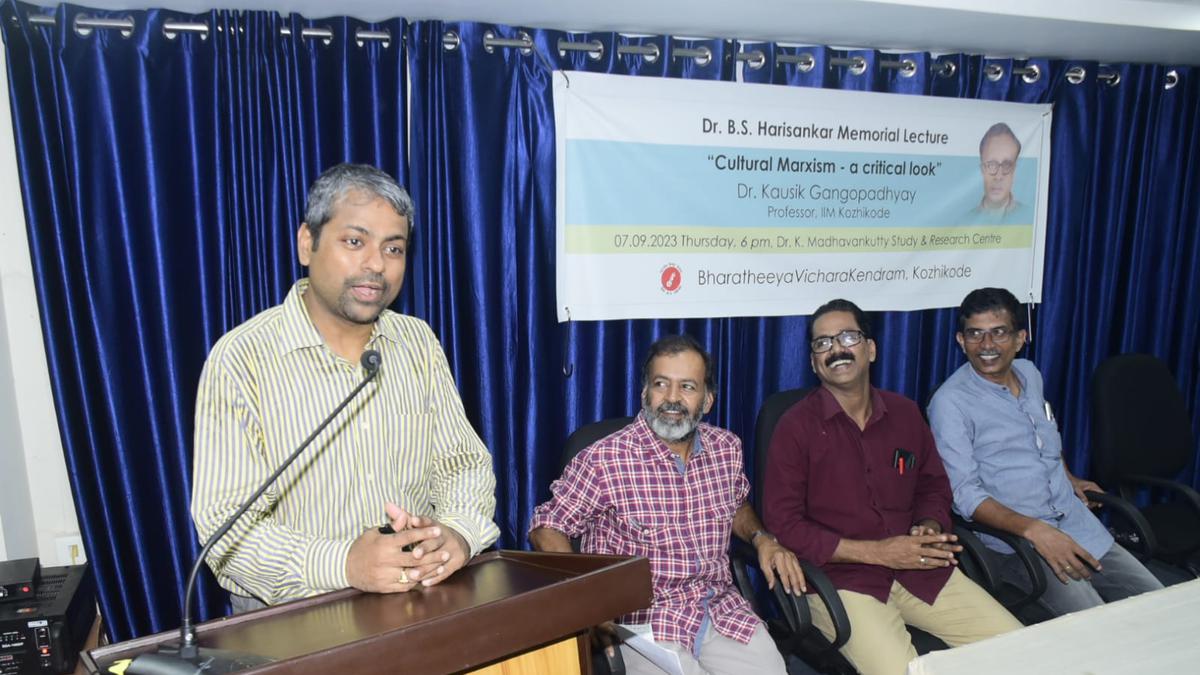
A section of Indian elite drawing inspiration from Cultural Marxism: economist
The Hindu
Cultural Marxism, originating from Antonio Gramsci's ideas, has spread to India's intellectual elite, says Prof. Kausik Gangopadhyay.
The impact of Cultural Marxism is not confined to the United States but many within India’s intellectual elite look to the West for inspiration, potentially resulting in the widespread adoption of those ideas within Indian society, according to Kausik Gangopadhyay, Professor of Economics, Indian Institute of Management, Kozhikode.
He was delivering the Dr. B.S. Harishankar (archaeologist and historian) Memorial Lecture on the topic ‘Cultural Marxism - a Critical Look’, organised by the Bharatheeya Vichara Kendram here on Thursday.
Prof. Gangopadhyay said Cultural Marxism, also called neo-liberalism, left-liberalism, or progressivism by the adherents, had emanated from the work of Antonio Gramsci, a communist leader from Italy who applied the ideas of Marx to the cultural domain. Gramsci’s application of Marxist ideas to the cultural sphere is what scholars like James Lindsay commonly refer to as Cultural Marxism, he said.
Cultural Marxism, he said, had made its way to the Frankfurt School in Germany, where scholars like Max Horkheimer and Theodor W. Adorno further refined such ideas. Herbert Marcuse, a student of this school, sought refuge in the United States during the Nazi era and introduced these concepts at Harvard University. This intellectual tradition also gave birth to Critical Theory and Postmodernism, Prof. Gangopadhyay pointed out.
He said Sheldon Pollock, an American scholar of Sanskrit who demonises the Sanskrit language as the cause of the Nazi Holocaust, had appealed to Critical Theory in the domain of Indology. The adherents of this theory believe in capturing media, academia, and pop culture to propagate the theory, which has actually happened in the United States, resulting in dogmatised education and sexualised content in school textbooks, he said.
Prof. Gangopadhyay said Cultural Marxism also promoted ‘Cancel culture’ in the US, resulting in an effective ban on alternative viewpoints in American university campuses and much of the American media.

“Writing, in general, is a very solitary process,” says Yauvanika Chopra, Associate Director at The New India Foundation (NIF), which, earlier this year, announced the 12th edition of its NIF Book Fellowships for research and scholarship about Indian history after Independence. While authors, in general, are built for it, it can still get very lonely, says Chopra, pointing out that the fellowship’s community support is as valuable as the monetary benefits it offers. “There is a solid community of NIF fellows, trustees, language experts, jury members, all of whom are incredibly competent,” she says. “They really help make authors feel supported from manuscript to publication, so you never feel like you’re struggling through isolation.”

Several principals of government and private schools in Delhi on Tuesday said the Directorate of Education (DoE) circular from a day earlier, directing schools to conduct classes in ‘hybrid’ mode, had caused confusion regarding day-to-day operations as they did not know how many students would return to school from Wednesday and how would teachers instruct in two modes — online and in person — at once. The DoE circular on Monday had also stated that the option to “exercise online mode of education, wherever available, shall vest with the students and their guardians”. Several schoolteachers also expressed confusion regarding the DoE order. A government schoolteacher said he was unsure of how to cope with the resumption of physical classes, given that the order directing government offices to ensure that 50% of the employees work from home is still in place. On Monday, the Commission for Air Quality Management in the National Capital Region and Adjoining Areas (CAQM) had, on the orders of the Supreme Court, directed schools in Delhi-NCR to shift classes to the hybrid mode, following which the DoE had issued the circular. The court had urged the Centre’s pollution watchdog to consider restarting physical classes due to many students missing out on the mid-day meals and lacking the necessary means to attend classes online. The CAQM had, on November 20, asked schools in Delhi-NCR to shift to the online mode of teaching.









